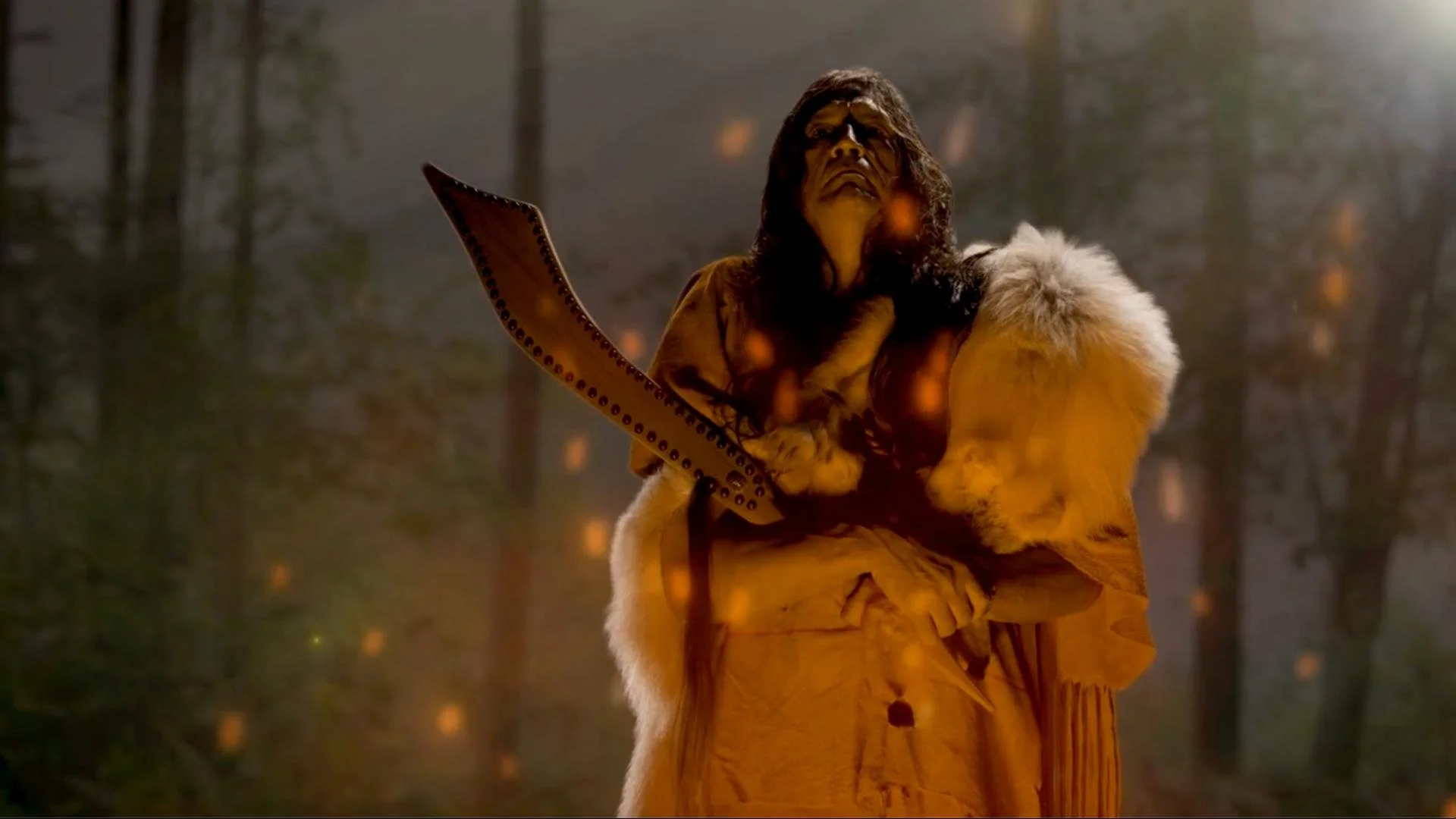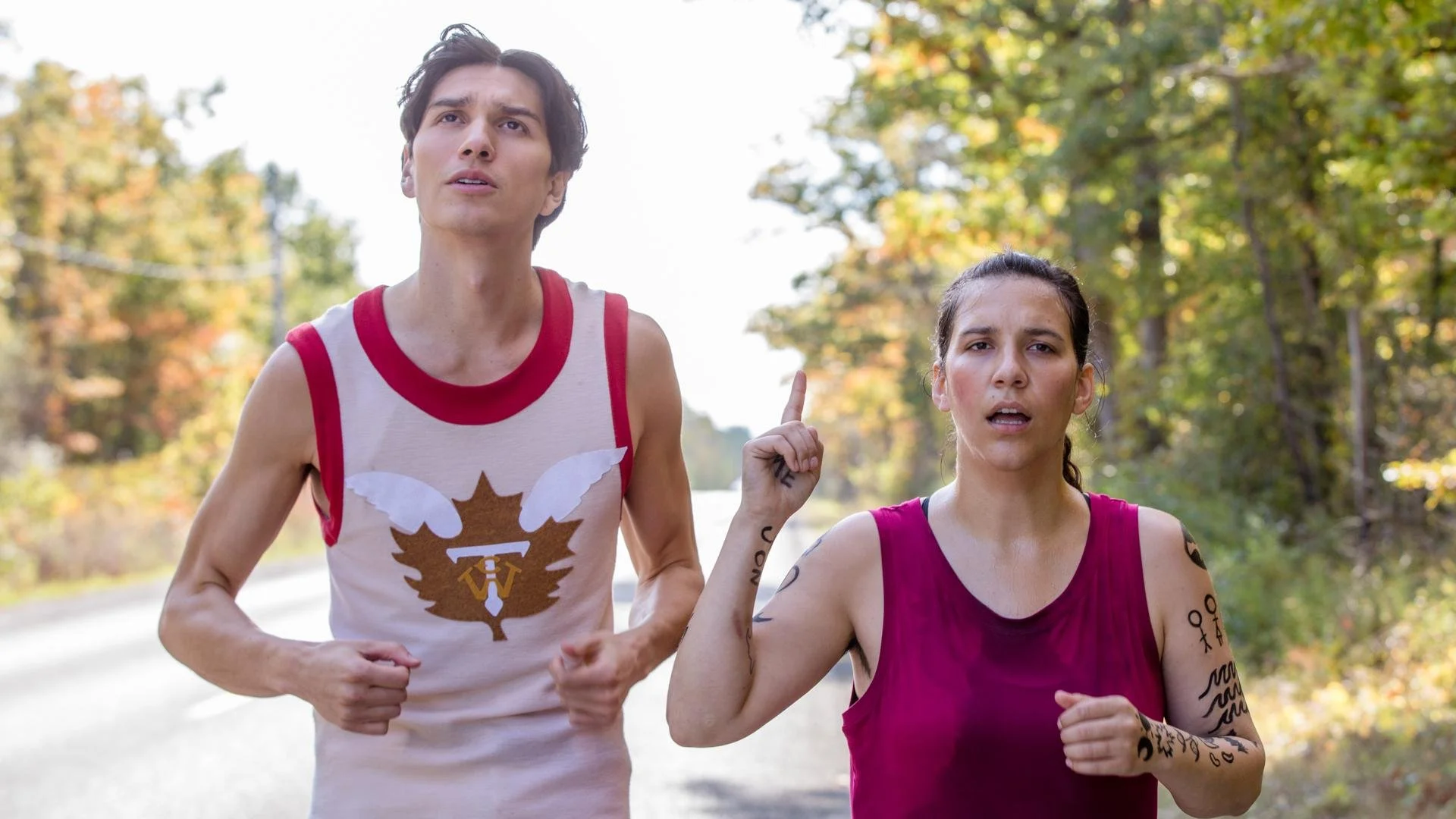Film reviews: Drinkwater, Tzoulahem, and Run Woman Run shine at Whistler Film Festival
Eric McCormack plays a doofus dad; a documentary shines a light on a Quamichan warrior chief; and a story of self-love is shot in Six Nations of the Grand River
Hank (Eric McCormack, left) and Mike (Daniel Dohney) are a father-and-son duo in Drinkwater.
Whistler Film Festival runs in person in Whistler to December 5 and online to December 31.
Drinkwater (pictured at top)
Screens December 5 at12:30 pm Village 8 Cinemas in Whistler and online from December 13 to December 31 via Whistler Film Festival.
Director Stephen Campanelli’s light-hearted Drinkwater is on one hand a sweet coming-of-age story that unfolds through the eventual high-school romance between Mike (Vancouver’s Daniel Dohney, Adventures in Public School) and Wallace (Louriza Tronco, also from Vancouver, The Order). On the other, it’s an entertaining trip down memory lane for anyone with a thing for the 1970s and ’80s, with so much kitsch and a Canadiana soundtrack fuelled by the likes of Trooper, Lover Boy, Bachman Turner Overdrive, and April Wine.
Mike—a Grade 12 student who’s usually in sweats and a hockey jersey and drives a Gremlin and whose bedroom is crammed with objects like a Rubik’s Cube, lava lamp, and record player—is as obsessed with Bruce Lee as he is with Danny (Chloe Babcook), the figure-skating star student who has it all, including the cool jock boyfriend, Luke (Jordyn Burtchett). Mike lives with his doofus dad, Hank (an amusing Eric McCormack, Will & Grace), who’s faking an injury from working at the local mine for the insurance money, father and son having been abandoned by Mike’s mom five years earlier. Wallace, who moves next door from the U.S. to live with her grandparents after tragically losing her own mom, is an extraordinarily generous friend to Mike despite his initial selfishness and obliviousness.
After Mike sets out to compete in a running race, Wallace begins pacing him, their casual training sessions being an opportunity for Campanelli (whose directing titles include Indian Horse and whose camera credits, as Clint Eastwood’s eye, include Million Dollar Baby) to showcase gorgeous scenery of the Okanagan, including parts of the famous KVR Trail. But she hits her breaking point and finally stands up for herself, the girl-power moment being one reason Tronco stands out in the film; she’s very sincere. Dohney shows off a knack for slapstick and gives Mike a kind-heartedness that makes it impossible not to like him, while McCormack is back in fine comedic form, whether appearing in a neck brace and pair of tighty-whities or driving a Zamboni. As Wallace’s grandparents, veteran actors Vincent Cheng and Linda Darlow are pure heart.
We love the LOL touch Alex Zahara gives to Mr. Babcock, the gym teacher (“I’ve got rejection cornered”) who helps point Mike in the right direction. And Campanelli’s creative opening credits are worth watching in their own right. GJ
Tzoulahem researches the oral history of one of the biggest “badasses” in Coast Salish lore.
Tzoulahem
Streams December 7 to 31 via the Whistler Film Festival
“It’s cool to see a badass who looks like you do badass things.” That quote from a young Cowichan Valley Indigenous teacher kind of nails what makes this new documentary so important—and so fun. As the interviewee goes on to explain, Indigenous people don’t have many heroes. And so filmmaker Leslie Bland, working with charismatic Cowichan cultural consultant/archeology assistant Harold Joe, brings the story of Tzoulahem to life. Likened here to a kind of carved-sword-wielding, pelt-wearing Rambo, Tzoulahem was a Quamichan warrior chief who, amid countless other bold exploits in the mid-1800s, led an attack on Fort Victoria and a huge canoe battle against the Kwakwaka’wakw Lekwiltok.
The documentary lets elders retell the stories passed down to them through generations—sometimes with fascinating variations—while travelling to the pertinent sites of the action, interviewing BC historians, and re-enacting the legend. Tzoulahem was a larger-than-life figure, huge in stature—some stories depict him as almost monstrous. Raised by a grandmother bent on revenge, he had as much lust for violence as he had for women. (His wife count ranges from about eight to 15, depending who’s telling the story.) Along the way, you’ll learn about everything from the impact of smallpox on Vancouver Island First Nations, including the fact that it sparked chaos and war between tribes, to all the action that took place on Cowichan landmark Mount Tzouhalem. This is land-based history at its most vivid, giving a colourful figure his due, but also finding lessons that still resonate. JS
Asivak Koostachin (left) and Dakota Ray Hebert in Run Woman Run.
Run Woman Run
Screens December 4 at 8:45 pm and December 5 at 1:45 pm at Village 8 Cinemas in Whistler and online to December 31.
At the beginning of Run Woman Run, Dakota Ray Hebert’s Beck is so lazy and unmotivated that when it’s time to check the mail, she opts to drive the dozen or so metres to the mailbox and back rather than walk, and spends her days in a bathrobe emblazoned with a pepperoni-pizza print. These kinds of comical touches give writer-director Zoe Leigh Hopkins’s sophomore feature its gentle humour.
Featuring a solid and exclusively Indigenous cast, Run Woman Run centres on the aftermath of Beck’s wake-up call: the young single mom with a sweet tooth is diagnosed with Type 2 diabetes, the same disease that took her own mother far too soon.
She lives in Six Nations of the Grand River—the most populous reserve in Canada in present-day southern Ontario, where the entire film was shot—sharing a home with her mild-mannered, good-hearted dad (Lorne Cardinal) and high-achieving sister (Jayli Wolf), who are constantly at her to take better care of her health. It’s only when Beck encounters the spirit of Tom Longboat—a real-life Onondaga running legend from the early 1900s, played by Asivak Koostachin—that things start to change. Buoyed by his encouragement and wise words, she begins training for a marathon, dedicating each of her outings to a different person in her life, while her parallel inner journey gets to the heart of why she’s so down, what she holds dear, and how she’s worthy of love—especially from herself.
Vulnerable and self-effacing, Beck is more complex than she at first seems, Hebert making her likeable and relatable. A heart-warming and engaging film with cinematography by Justin Black and music by composer Anthony William Wallace, Hopkins strikes just the right tone with her balance of levity and emotion, all while weaving in cultural practices, conveying the importance of saving the Mohawk language that colonialism nearly wiped away, and introducing viewers to Longboat (who was inducted into Canada’s Sports Hall of Fame in 1955). Now if only we could find out where the crew sourced that pepperoni-print housecoat. GJ















